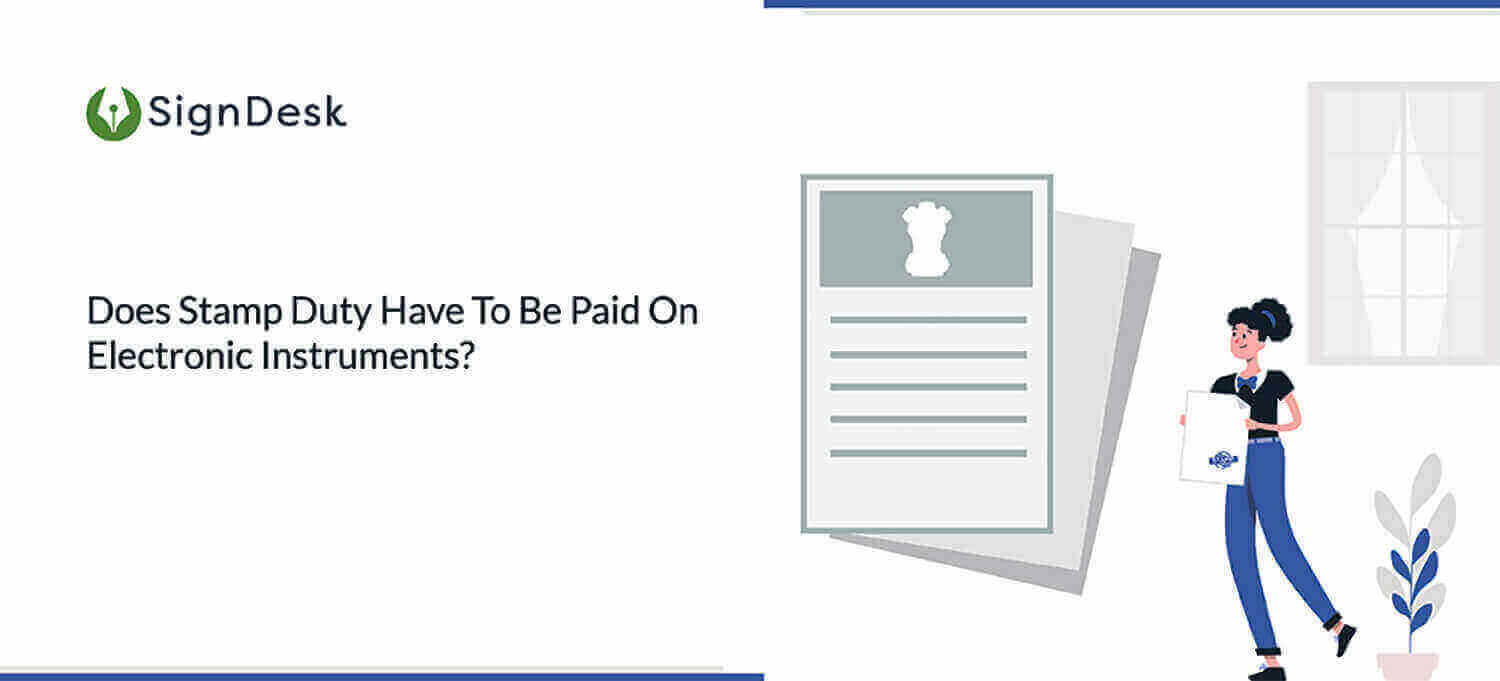At some point, most of us have registered our legal documents by getting the document stamped and paying stamp duty. But does the same procedure hold for electronic instruments?
Before tackling this question, let’s first define precisely what electronic instruments are.

What are electronic instruments?
To understand what electronic instruments are, we must first define what an “Instrument” is.
The Indian Stamp Act (1899) defines “Instrument” in Section 2(14) as:
Instrument– instrument includes every document by which any right or liability is, or purports to be, created, transferred, limited, extended, extinguished or recorded.
Therefore, for our purposes, Instruments are formally executed documents that express a legally enforceable act, contractual obligation, or right. Examples of instruments are – contracts, certificates, or deeds.
Now, what do the laws have to say about electronic instruments?
Although there is no mention of electronic instruments in the Indian Stamp Act (1899), the Stamp Laws of some individual states do define electronic instruments.
Section 2(19) of the Rajasthan Stamp Act, 1998; Section 2(l) of the Maharashtra Stamp Act, 1958 and Section 2(14) of the Uttar Pradesh Stamp Act, 2008 define “Instruments,” this definition also includes electronic instruments:
“instrument” includes every document by which any right or liability is, or purports to be, created, transferred, limited, extended, extinguished, or recorded;
[Explanation – The term “document” also includes any electronic record as defined in clause (t) of sub-section (1) of section 2 of the Information Technology Act, 2000].
The Tamil Nadu Stamp Act, 2013 does not include electronic instruments in the definition of instruments; however, Section 2(10), which defines “executed” and “execution” includes electronic records:
“executed” and “execution”, used with reference to instruments, means, “signed” and “signature”, respectively;
Explanation.” The terms “signed” and “signature” also include attribution of electronic record as per Section 11 of the Information Technology Act, 2000 (Central Act 21 of 2000);
From all this, we can say that electronic instruments are essentially digital counterparts to instruments. Hence electronic instruments include things like electronic contracts, electronic certificates, and so forth.
Now that we know what electronic instruments are let’s get to the burning question.
Should you pay stamp duty on electronic instruments?
For us to adequately answer this question, we must first determine when stamp duty must be paid. Section 3 of the Indian Stamp Act (1899) broadly defines two criteria to decide whether stamp duty is to be paid:
- The document attracting stamp duty payment must be an “instrument.”
- The instrument must be executed
We have seen in the previous section that electronic instruments are indeed classified under the law as instruments. But can they also be executed?
In the case of contracts, Section 10 of the Indian Contract Act, talks about when Agreements become Contracts:
“All agreements are contracts if they are made by the free consent of parties competent to contract, for a lawful consideration and with a lawful object, and are not hereby expressly declared to be void.”
Therefore electronic contracts, which are enforceable in a court of law, must attract stamp duty payment.
For electronic instruments in general, Section 2(12) of the Indian Stamp Act defines the terms “executed” and “execution.” A recent amendment has widened the scope of this section to take into account the electronic records’ attribution. This means that the attribution of electronic records covered in Section 11 of the IT Act (2000), will also be treated as execution.
Therefore, under the present laws, stamp duty must be paid on electronic instruments.
This leads us to the question of how you should pay stamp duty on electronic instruments.
How can you pay stamp duty on electronic instruments?
The traditional way of paying stamp duty would involve taking a physical copy of the electronic instrument and then franking it or paying for the stamp certificate. This will not work here as it defeats the entire purpose of having an electronic version of the document in the first place!
Therefore one must pay stamp duty on electronic instruments via digital stamping.
SignDesk’s stamp duty payment solution – stamp.it supports digital stamping and is currently in use by over 50 major Indian banks to pay stamp duty online.
SignDesk leverages a robust legal understanding and operations support to provide you with a digital stamping product in use by over 70% of the market.
e Stamping has been shown to massively reduce turnaround time, increase productivity, and reduce operating costs. Stamp.it, in particular, has reduced TAT by nearly 99% for our clients.
Book a free demo with us now to see how we can do the same for you!